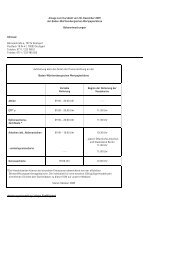080305_JPM Series Fix and Win ... - Börse Stuttgart
080305_JPM Series Fix and Win ... - Börse Stuttgart
080305_JPM Series Fix and Win ... - Börse Stuttgart
Erfolgreiche ePaper selbst erstellen
Machen Sie aus Ihren PDF Publikationen ein blätterbares Flipbook mit unserer einzigartigen Google optimierten e-Paper Software.
which such regulatory requirements are interpreted or enforced, will not have a negative effect on <strong>JPM</strong>CB’s<br />
ability to conduct its business or its results of operations.<br />
<strong>JPM</strong>CB faces significant legal risks, both from regulatory investigations <strong>and</strong> proceedings <strong>and</strong> from<br />
private actions brought against <strong>JPM</strong>CB.<br />
<strong>JPM</strong>CB may be named as a defendant or otherwise be involved in legal proceedings, including class actions <strong>and</strong><br />
other litigation or disputes with third parties, as well as investigations or proceedings brought by regulatory<br />
agencies. Such actions brought against <strong>JPM</strong>CB may result in judgments, settlements, fines, penalties or other<br />
results adverse to <strong>JPM</strong>CB which could materially adversely affect <strong>JPM</strong>CB’s business, financial condition or<br />
results of operation, or cause it serious reputational harm.<br />
<strong>JPM</strong>CB’s ability to attract <strong>and</strong> retain qualified employees is critical to the success of its business <strong>and</strong><br />
failure to do so may materially adversely affect its performance.<br />
<strong>JPM</strong>CB’s employees are its most important resource <strong>and</strong>, in many areas of the financial services industry,<br />
competition for qualified personnel is intense. If <strong>JPM</strong>CB is unable to continue to retain <strong>and</strong> attract qualified<br />
employees, its performance, including its competitive position, could be materially adversely affected.<br />
Government monetary policies <strong>and</strong> economic controls may have a significant adverse affect on <strong>JPM</strong>CB’s<br />
businesses <strong>and</strong> results of operations.<br />
<strong>JPM</strong>CB’s businesses <strong>and</strong> earnings are affected by the fiscal or other policies that are adopted by various<br />
regulatory authorities of the United States, non-U.S. governments <strong>and</strong> international agencies. For example,<br />
policies <strong>and</strong> regulations of the Federal Reserve Board influence, directly <strong>and</strong> indirectly, the rate of interest paid<br />
by commercial banks on their interest-bearing deposits <strong>and</strong> also may affect the value of financial instruments<br />
held by <strong>JPM</strong>CB. The actions of the Federal Reserve Board also determine to a significant degree <strong>JPM</strong>CB’s cost<br />
of funds for lending <strong>and</strong> investing. In addition, these policies <strong>and</strong> conditions can adversely affect <strong>JPM</strong>CB’s<br />
customers <strong>and</strong> counterparties, both in the United States <strong>and</strong> abroad, which may increase the risk that such<br />
customers or counterparties default on their obligations to <strong>JPM</strong>CB.<br />
<strong>JPM</strong>CB’s framework for managing its risks may not be effective in mitigating risk <strong>and</strong> loss to <strong>JPM</strong>CB.<br />
<strong>JPM</strong>CB’s risk management framework is made up of various processes <strong>and</strong> strategies to manage <strong>JPM</strong>CB’s risk<br />
exposure. Types of risk to which <strong>JPM</strong>CB is subject include liquidity risk, credit risk, market risk, interest rate<br />
risk, operational risk, legal <strong>and</strong> reputational risk <strong>and</strong> fiduciary risk, among others. There can be no assurance<br />
that <strong>JPM</strong>CB’s framework to manage risk, including such framework’s underlying assumptions, will be effective<br />
under all conditions <strong>and</strong> circumstances. As <strong>JPM</strong>CB's businesses grow <strong>and</strong> markets in which they operate<br />
continue to evolve, <strong>JPM</strong>CB's risk management framework may not always keep sufficient pace with those<br />
changes. For example, as the derivatives markets continue to grow <strong>and</strong> <strong>JPM</strong>CB participation in these markets<br />
exp<strong>and</strong>s, there is the risk that the credit <strong>and</strong> market risks associated with new products may not be appropriately<br />
identified, monitored or managed or that the documentation of these trades by <strong>JPM</strong>CB or its counterparties will<br />
not keep up with the increased pace of settlements. In addition, in the case of credit derivatives that require<br />
physical settlement of transactions, many market participants, including <strong>JPM</strong>CB, do not always hold the<br />
underlying securities or loans relating to such derivatives; if <strong>JPM</strong>CB is not able to obtain those securities or<br />
loans within the required timeframe for delivery, this could cause <strong>JPM</strong>CB to forfeit payments otherwise due to<br />
it.<br />
If <strong>JPM</strong>CB's risk management framework proves ineffective, whether because it does not keep pace with<br />
changing <strong>JPM</strong>CB or market circumstances or otherwise, <strong>JPM</strong>CB could suffer unexpected losses <strong>and</strong> could be<br />
materially adversely affected. If <strong>JPM</strong>CB does not effectively manage its liquidity, its business could be<br />
negatively affected.<br />
A09110530 AF 31
















